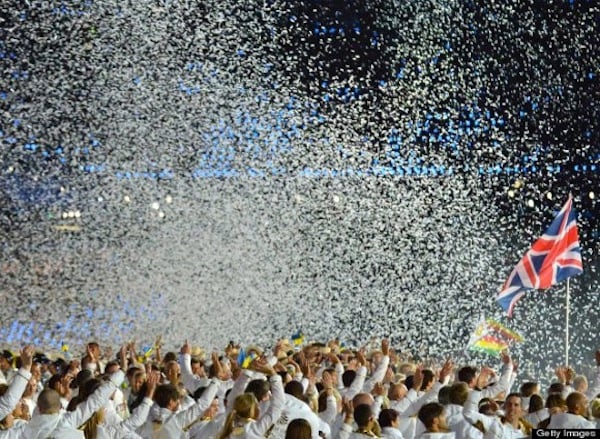International Relations and the Olympics

Athletes celebrate during the opening ceremony for the 2012 Olympics. Source: Getty
As the 2012 Olympics come to an end, we could list off the medals received, the records broken, and the athletic milestones reached. For the foreign policy enthusiasts among us, an Olympic recap inevitably includes another kind of list — a list of the geopolitical issues that the Games have highlighted. With more countries represented in the Olympics than in the United Nations, the Olympics shine a spotlight on global politics, both in terms of a country’s domestic issues and its interactions with the rest of the world. My brief and inevitably incomplete list of political issues on display at the Games includes the following:
- Each country competing in the Olympics sent a woman to the Games for the first time because of the participation of previous holdouts Saudi Arabia, Qatar and Brunei. An Iranian woman’s success in canoeing is an example of the tenacity of female athletes in countries where women’s athletic participation confronts exceptional obstacles. When Iranian laws barred Arezou Hakimimoghaddam from international swimming competitions because these competitions would require her to wear a swimsuit, she turned to canoeing, performing exceptionally well in this sport.
- This year, as in some others, several athletes competing are not representing any country. A marathon runner, Guor Marial, is competing as an independent athlete. Marial is a citizen of the newly independent nation of South Sudan, which does not have an Olympic committee. Marial declined Sudan’s offer to compete on its team, explaining that 28 of his family members were killed in the civil war between the countries.
- Seven Olympians from impoverished Cameroon, “including the entire boxing team and half its swimming team,” have disappeared from the Olympics, reportedly in an attempt to stay in Europe for economic reasons. Athlete asylum seekers are themselves a staple of the Games.
- Sixteen year-old Chinese swimmer Li Shiwen’s incredible performance in a 200-meter race led to accusations of doping. These accusations, in turn, provoked a Chinese official to characterize critics as being “jealous of the fact that China has become powerful in swimming.” Read more from an interesting New York Times article here.
- Like in the 2008 Games, the United States and China were in a so-called medals race this year, holding the top two spots for number of overall medals and number of gold medals by a wide margin. I wouldn’t be surprised if this medals race features in more than a few op-eds about the state of U.S. economic competitiveness relative to China’s.
- Indeed, comparing countries medal-by-medal raises questions of the political and economic conditions necessary for large-scale Olympic success. The United States, China, Russia, Great Britain and South Korea are the top five recipients of medals, suggesting, unsurprisingly, that a country’s size and wealth are clear-cut factors in success at the Games. As a Goldman Sachs economist who has studied the determinants of Olympic success said in a recent interview, “Overall, higher levels of income or higher levels of development tend to be associated with more Olympic success.” At U.S. News and World Report, Journalist Rick Newman has interesting ranked lists of countries’ medals per GDP and per population.
Ultimately, though, what I love about the Olympics is that which “everything is political” and “it’s the economy” cannot fully explain. For the past two weeks, Olympians have performed athletic feats that seem almost superhuman — and people watching the Olympics around the world have soared through the air with the divers and scored goals on the Olympic soccer field with their countries’ teams. Here’s to London 2012.
